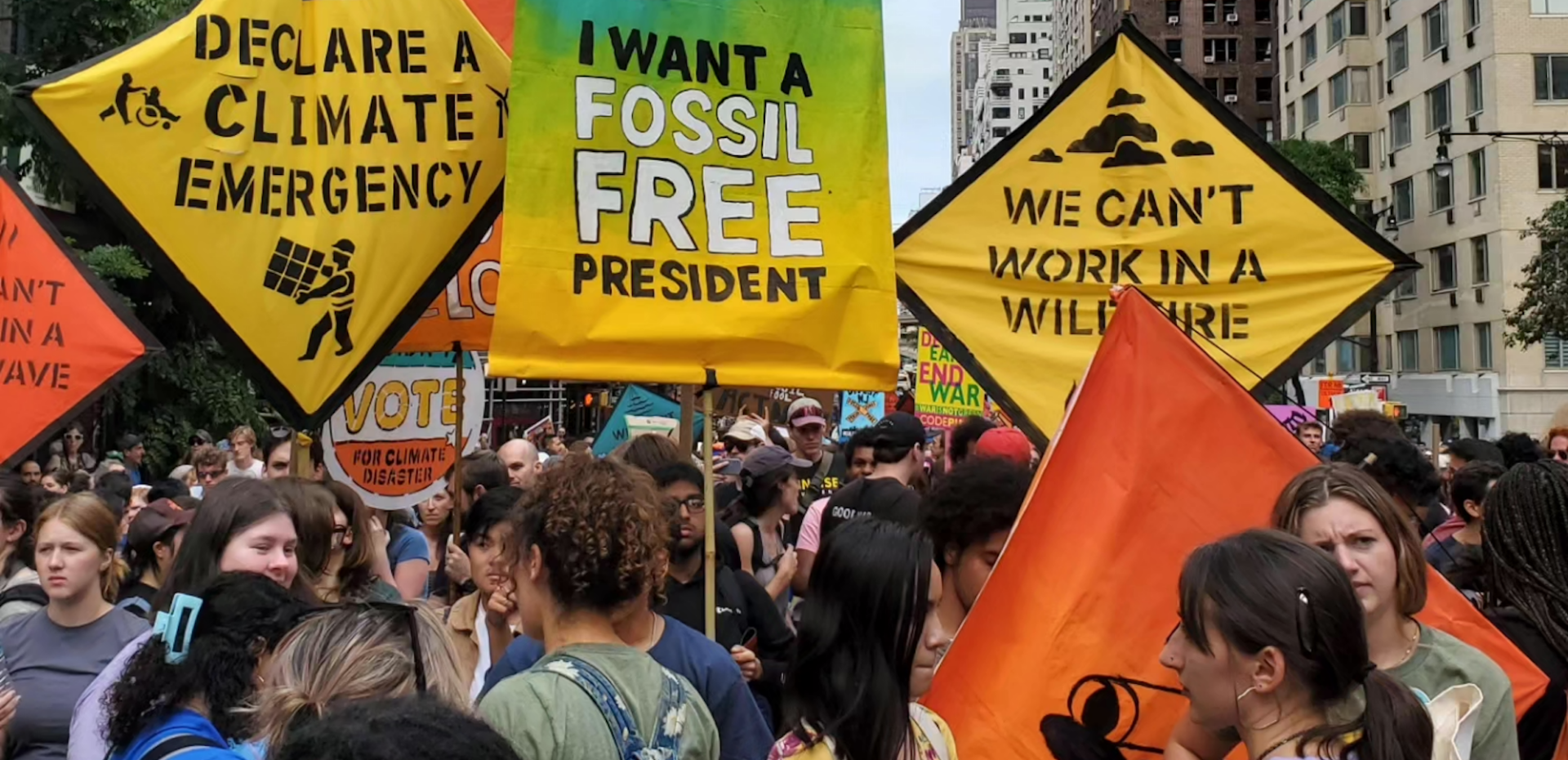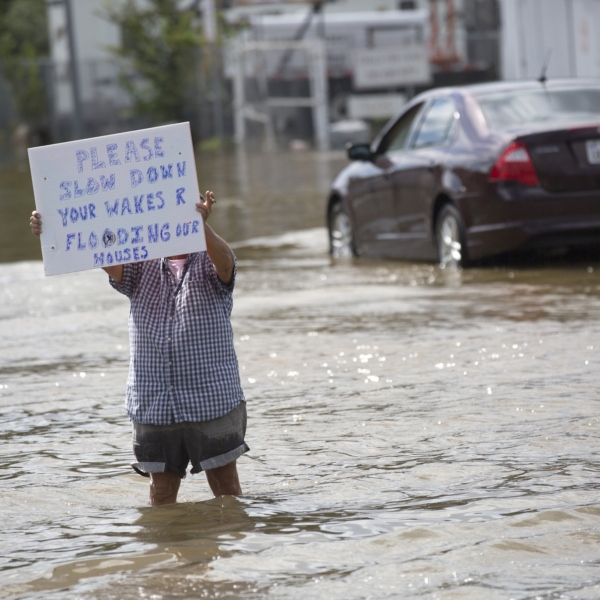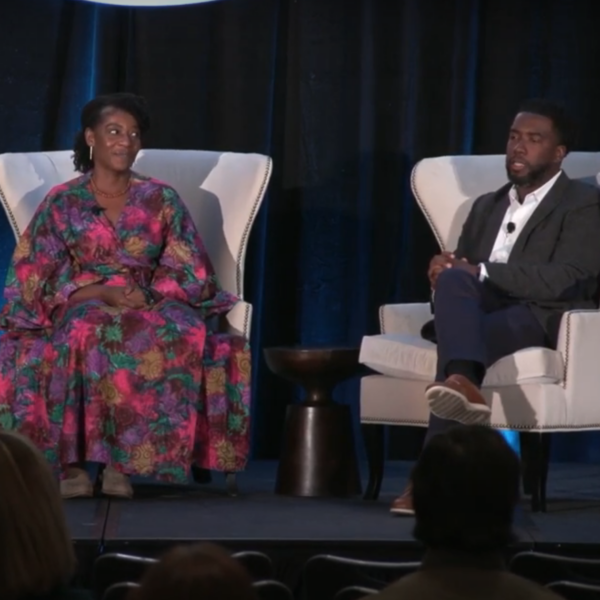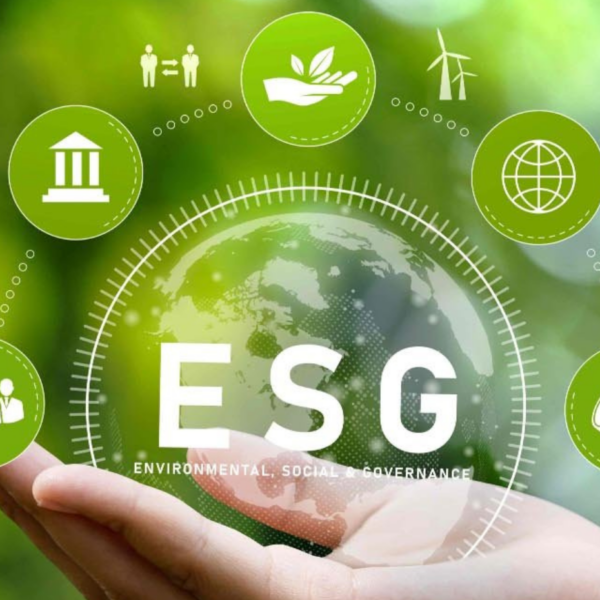Co-Creating Climate Justice Through Stakeholder Collaboration
October 5, 2023
A Look at the E in ESG: Connecting for B Corp Environmental Impact Improvement
This article is a personal perspective from an employee at B Lab, the nonprofit behind Certified B Corporations. In this series, we invite B Lab employees to share their experiences, inspiration, hopes, and challenges as they work toward a more inclusive and regenerative world. This edition of B Lab Voices is from Kylie Nealis, Senior Program Manager for Climate Justice.
I’ve learned many important lessons since joining the team at B Lab U.S. & Canada a year and a half ago. Three are crucial for the Certified B Corporation community’s work to advance climate justice and reduce its environmental impact:
- Collaboration is key,
- Bringing the right people together at the right time is instrumental, and
- In-person connections are irreplaceable.
All three of these lessons were reinforced during two recent opportunities I had to co-create climate justice experiences in partnership with a diverse group of leaders. They included an immersive Climate Justice Innovation Lab in Rio de Janeiro, Brazil, and participation in Climate Week in New York City.
Climate justice is one of the three pillars in B Lab U.S. & Canada’s Theory of Change alongside a stakeholder economy and racial equity. At its core, climate justice is the recognition that those who are least responsible for climate change are more likely to be impacted and suffer its most devastating effects. Around the world, these are predominantly People of Color and systematically oppressed communities on the frontlines of climate change.
That’s why it’s crucial for the B Corp community to listen to, center, and uplift the voices of people most affected in work to advance climate justice. This was a common thread during my conversations in Brazil and in New York City. I returned from both experiences feeling grateful for time in community with so many dedicated people with diverse perspectives working toward climate justice, specifically those living on the frontlines.
For the B Corp community, climate justice is a part of impact improvement related to environmental, social, and governance (ESG) factors. As companies that commit to actions that benefit the planet and people, B Corps broaden their focus beyond profit to incorporate stakeholders including the environment, community, consumers, and workers. Amid recent ESG policy discussions, climate action demonstrates one way that B Corps are going beyond typical business practices to enhance their environmental impact.
Learn more about the ESG policy landscape in a recent B Lab U.S. & Canada webinar.
Some of my top takeaways from my two recent experiences, offer examples of collaborative environmental impact improvement in the B Corp community.
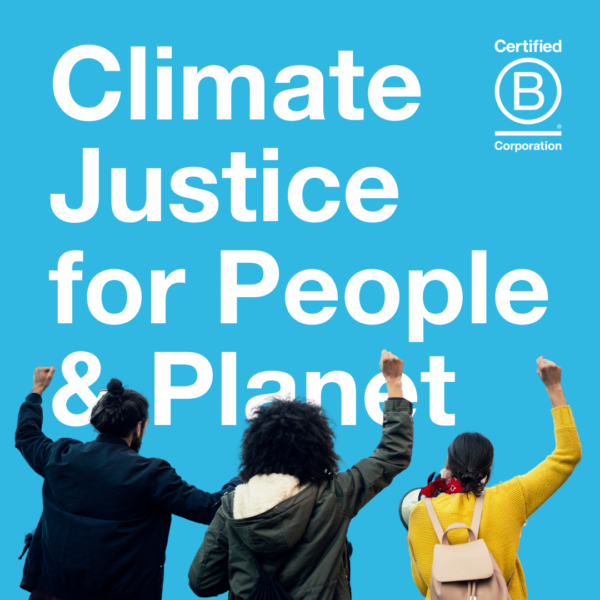
Earth Month 2023 Toolkit: Climate Justice for People and Planet
This free resource helps businesses engage in reflection, learning, and action around climate justice. The toolkit includes a Climate Justice Reflection Challenge, glossary, and calls to action.
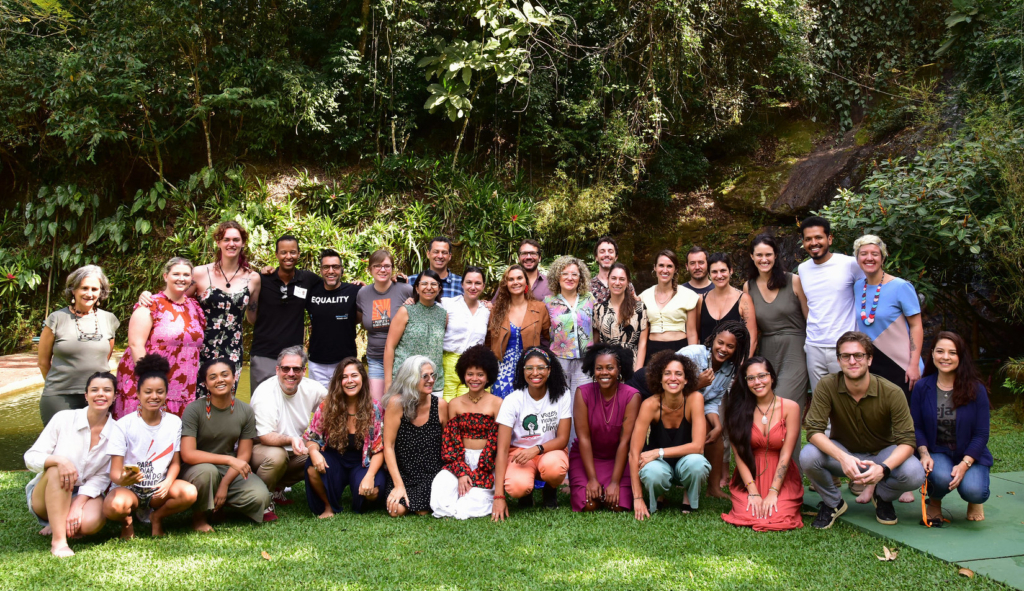
Participants at the 2023 Climate Justice Innovation Lab gathered outside Rio de Janeiro, Brazil.
A Climate Justice Innovation Lab for the Americas
The Climate Justice Innovation Lab took place in mid-August and was hosted by the BMW Foundation Herbert Quandt and Climate Ventures. I was invited to attend along with 35 other leaders from North and South America to develop recommendations for how to advance climate justice throughout the Americas. These leaders — many of whom I came to call friends after our time together — represented civil society, impact investment and philanthropic organizations, businesses, NGOs and, most importantly, youth and frontline community leaders working on the ground in Brazil from the Amazon Basin to Bahia on the northern coast to the major cities of Rio de Janeiro and São Paulo. While I was unsure of what to expect, it turned out to be unlike any convening that I have attended in the past, in some amazing ways.
As the first of two phases, we gathered to share knowledge and experiences around climate justice and deepen our understanding of the situation across the two continents. During the second stage (coming in 2024–2025), the Climate Justice Innovation Lab will foster collaboration among organizations. The aim is to bring together knowledge and experience, social capital, and financial resources to create solutions for climate justice across countries, communities, and cultures.
Over three days in mid-August, the group got to know each other over meals. We shared our various roles and networks, explored the root causes and dimensions of climate injustice, and met with people in local communities who are helping to build climate adaptation and resilience. They are frontline community members who rely on the surrounding natural ecosystem, especially the local rivers, for their livelihoods.
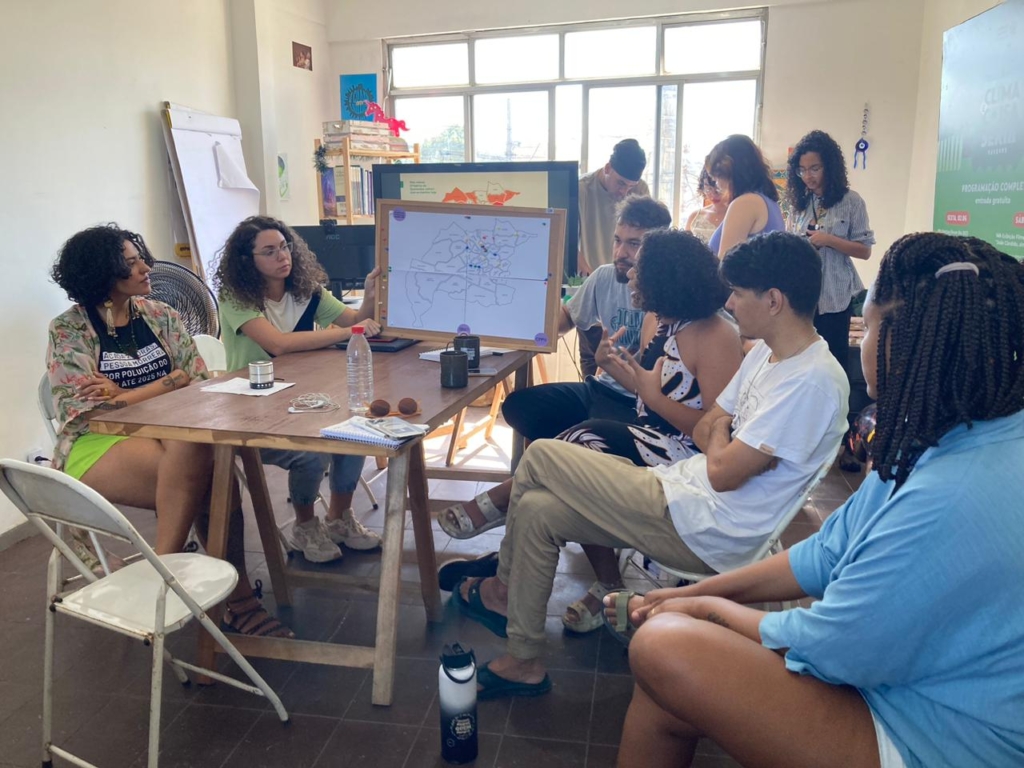
The youth-led team at Visão Coop shows a map of flood zones in their community.
One of the most impactful parts of the trip was the day we spent in the field meeting with people in one of three communities. I visited Visão Coop, a social enterprise in the nearby city of Queimados. Deemed one of the most violent cities in the country by coop members, Queimados is plagued each year by severe floods. The coop members shared a myriad of ways that floods affect the local community. Other social and environmental issues compound these effects. Examples they shared include: contamination of the community’s drinking water supply, insect-borne diseases from poor sanitation like malaria and Zika virus, flooded homes and businesses, skin diseases from exposure to water polluted with chemicals from local industry during the floods, and washed out roads and bridges that limit access to hospitals and schools.
The youth-led team at Visão Coop engages in initiatives to build climate adaptation and resilience, and support residents. This includes producing media publications on environmental racism, providing support to residents during floods, advocating for better infrastructure with city and regional government officials to prevent flooding and improve sanitation, collecting data on areas most impacted, and uplifting the stories of impacted community members through interviews and documentaries. Coop members spoke about the challenges of gaining access to areas of the city to carry out their work due to pervasive violence and the tight control of gangs and militias.
While our visit to Queimados was intense and the reality of the situation stark, it was inspiring to meet with and learn from the Visão Coop youth leaders building climate resilience and advancing social justice in their community. Their stories reinforced for me that climate and health are inextricably linked.
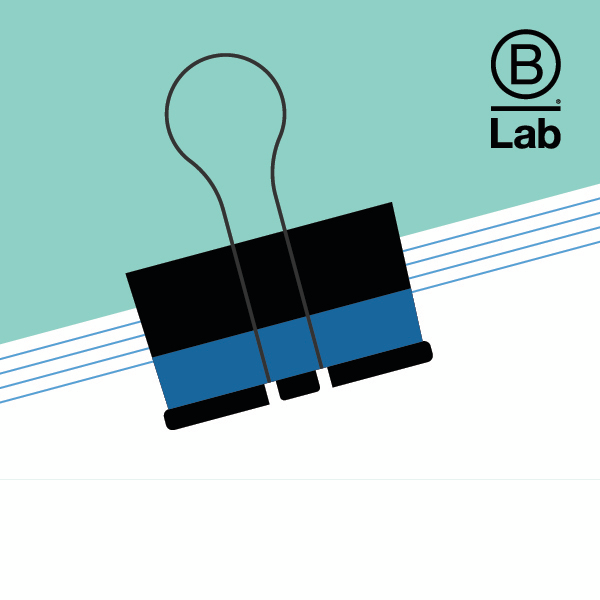
How Businesses Are Addressing Climate Change
Is your business looking for ideas on making a positive environmental impact? Check this free online report from B Lab that compiles articles and resources to help your business become a climate leader. Whether you work at a large company or an agency, get inspired to do more today.
Irreplaceable In-Person Connections with B Corps at Climate Week
Fast forward three weeks after I returned from Brazil (with lots of cuddles with my toddler in between) to Climate Week 2023. This annual week of climate action events is inspiring and rewarding as well as busy and exhausting.
My time in Brazil showed me that we do some of our best co-creation work while connecting in-person. While meeting virtually enables us to collaborate with people we otherwise might not get to, it was clear over the few days that I was in New York City that people throughout the climate movement are eager for in-person connection.
I was particularly excited to be able to connect with B Corps and partner organizations during Climate Week. Two Climate Week events stood out: were the March to End Fossil Fuels, and a workshop that B Lab U.S. & Canada co-hosted with Forum for the Future.
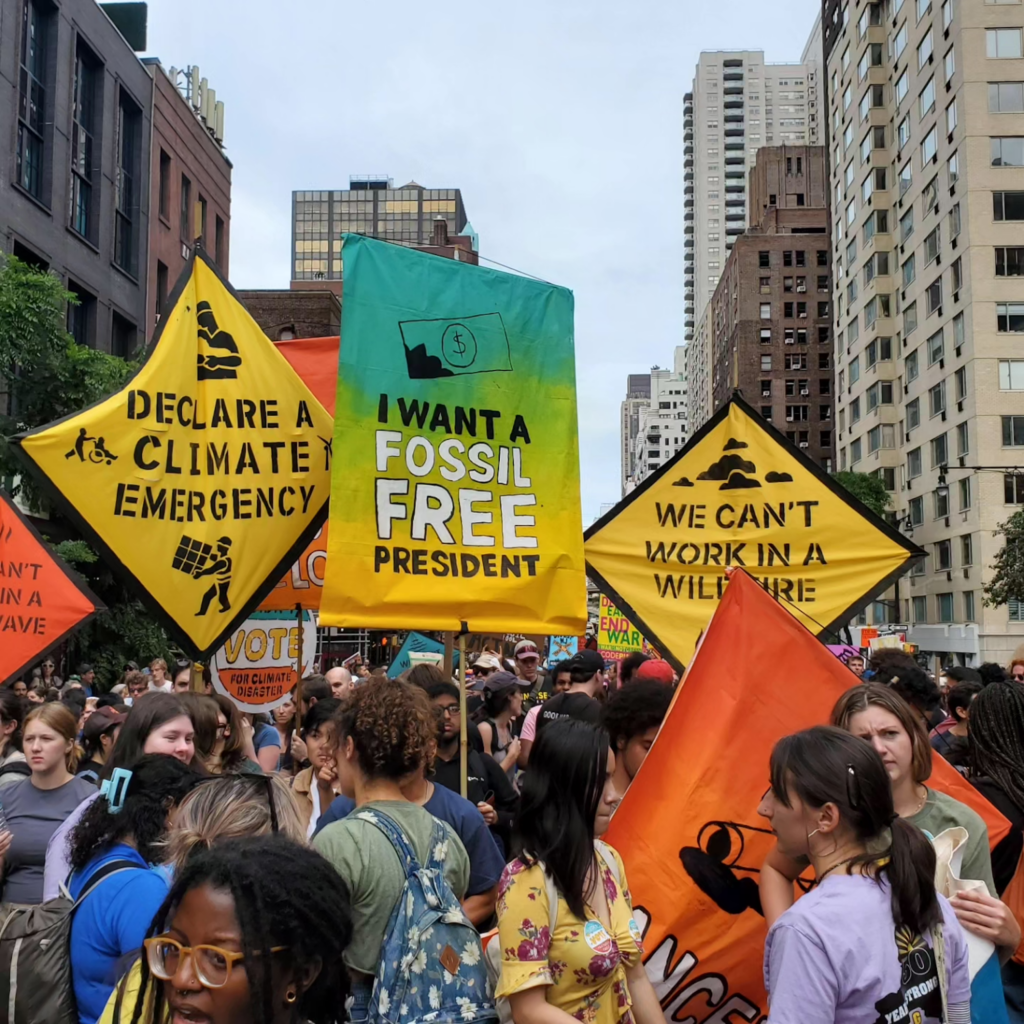
Thousands of people joined the March to End Fossil Fuels in the lead-up to Climate Week.
A March to End Fossil Fuels
On the Sunday before Climate Week, an estimated 75,000 people hit the streets of New York City to demand an end to fossil fuels and call on President Biden to declare a climate emergency. Organized by People vs. Fossil Fuels, a national coalition of more than 1,200 frontline community groups, the March to End Fossil Fuels drew a range of participants of varied ages, sectors, and backgrounds . It was the largest climate demonstration in the U.S. since the COVID-19 pandemic started in 2020. Personally, having attended the People’s Climate March in New York City in 2014 when more than 400,000 people took to the streets, it was exciting to experience that kind of energy and momentum again. This recap video from the march organizers provides a sense of what it was like.
After the march, more than 50 B Corp leaders gathered for a networking happy hour that B Lab U.S. & Canada co-hosted with B Corp Seventh Generation. Several New York-area B Corps joined Seventh Generation in a a Business for Climate Justice contingent in the march.
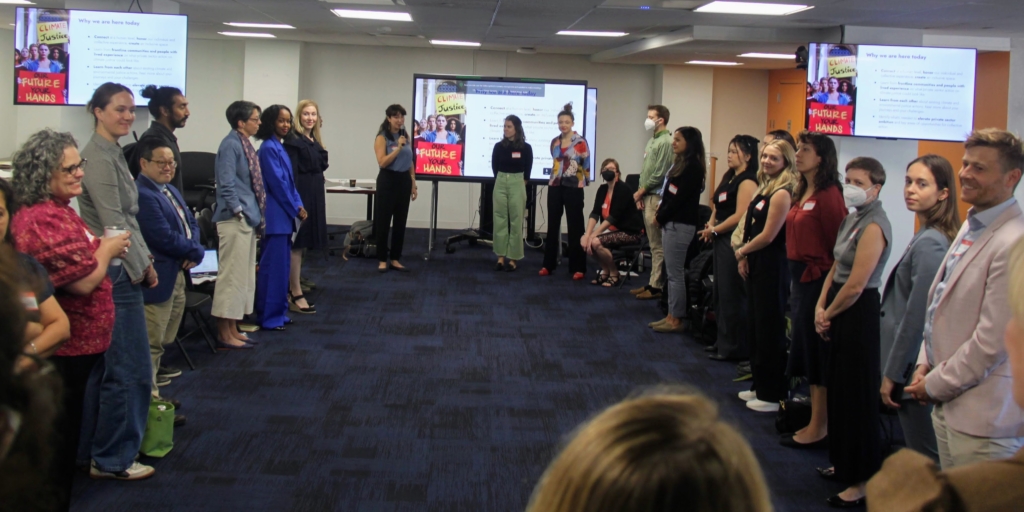
The workshop on collective action for climate justice began with a grounding and diversity welcome. Amalgamated Bank’s midtown location hosted the workshop.
A Workshop on Practical Guidance for the Private Sector to Accelerate Collective Action on Climate Justice
Every now and then you embark on a partnership that unlocks the ability to scale and inform your work in new and exciting ways. That’s the case for B Lab U.S. & Canada’s climate justice work with Forum for the Future’s American Climate Futures Program. We are co-developing practical guidance for the private sector to accelerate collective action on climate justice, and uncovering opportunities for a multi-sectoral and collaborative approaches. At Climate Week, we convened around 50 business leaders taking action on climate justice to share key learnings and identify where collective action is needed to accelerate progress. Areas of focus included:
- Identifying actions across internal operations, including employee policies and required mindset shifts for businesses to advance climate justice by moving from extractive and exploitative to equitable and regenerative.
- Exploring existing business and operating models that are centering justice and equity.
- Identifying where we might leverage collective influence and strategic partnerships for just policy solutions.
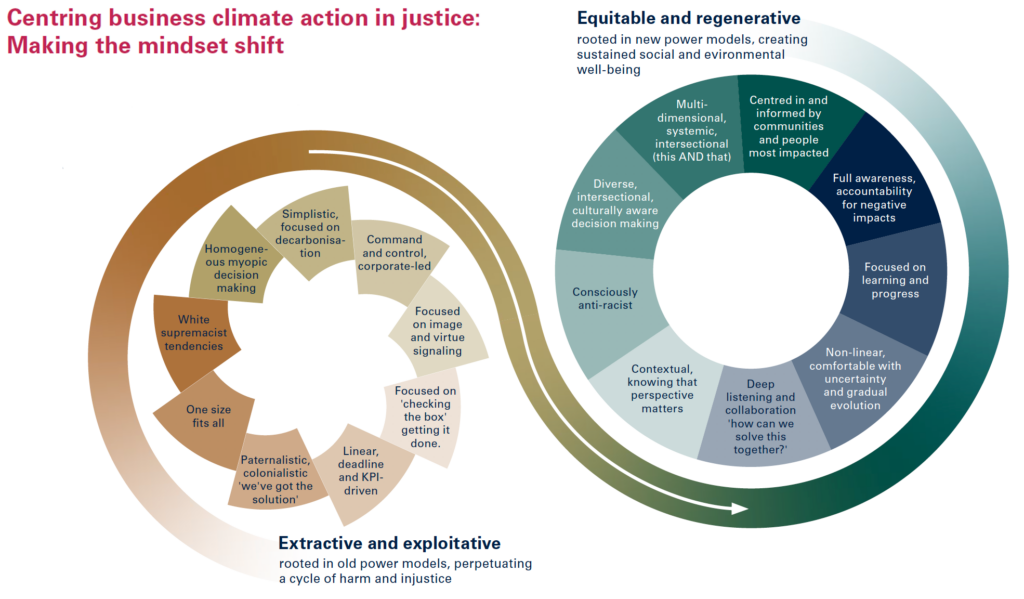
This excerpt from the Climate Justice Playbook for Business shows the business mindset shift needed to advance climate justice.
This session was informed by existing research and insights from frontline community groups and climate justice organizations gathered over the past year. We were joined by two people representing organizations working to advance climate justice in communities: Kiana Kazemi, Programs Director at Intersectional Environmentalist, and Elizabeth Joseph, Assistant Director of the New Rochelle Public Library. Kazemi discussed the intersections between climate and racial justice, and the critical role that youth are playing in the climate justice movement. Joseph described her work running a community resilience hub through her library as part of a broader national organization, Communities Responding to Extreme Weather (CREW). She emphasized the importance of public spaces like libraries as places of refuge during climate-related disasters. The output of the session will go into a shared practical guidance to be co-published in early 2024 by B Lab U.S. & Canada and Forum for the Future’s American Climate Futures Program. Stay tuned!
These two events reinforce how B Corps are collaborating and innovating for environmental and social impact improvement. Ultimately, co-creating climate justice can and must take on many different forms if we’re going to shape a more just and sustainable future. Bringing together diverse groups of people with different perspectives to co-create strategies and approaches to advancing climate justice takes time, resources, and organization. My recent experiences in Brazil and New York City taught me that if we do it with intention and move at the speed of trust, the future of our planet — and all of the people that call it home — will benefit.
Learn more about B Lab U.S. & Canada’s climate justice work:
Sign Up for our B The Change Newsletter
Read stories on the B Corp Movement and people using business as a force for good. The B The Change Newsletter is sent weekly.
